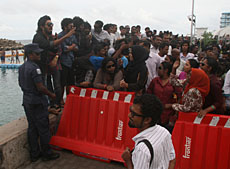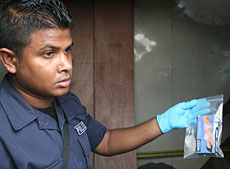The Human Rights Commission of the Maldives (HRCM) has completed investigations into alleged police brutality and retaliatory “acts of terrorism” alleged to have been conducted by anti-government protesters on February 8, 2012.
Two separate investigations related to the conduct of both police and anti-government protesters on February 8 were today sent to authorities including the Prosecutor General’s office and parliament. The completion of the investigations comes just 24 hours after the HRCM sent its findings concerning the controversial detention of Criminal Court Chief Judge Abdulla Mohamed to the same bodies.
HRCM member Jeehan Mahmoud said all but one of its investigations into the government changeover in February and the events that led up to it had now been completed. One more report into the alleged human rights abuses conducted by police on the day of February 7 was left to be completed, she added.
Despite not having yet seen the findings, representatives of the government-aligned Progressive Party of the Maldives (PPM) today welcomed investigations from national independent institutions such as HRCM. The now opposition Maldivian Democratic Party (MDP) meanwhile said it too would wait on the outcome of the investigations, but claimed that it remained sceptical about the independence of the investigation and the HRCM.
Nasheed investigation
The HRCM investigations, which saw former President Mohamed Nasheed become the first leader of the Maldives to be brought before the commission over the detention of Judge Abdulla Mohamed, also looked into acts perpetrated against the deposed former leader and his supporters following his controversial resignation. Nasheed claimed he was forced to resign from office on February 7 in a “coup d’etat.”
Jeehan Mahmoud said that aside from the investigation into Judge Abdulla Mohamed’s detention, additional reports had today been dispatched to the Prosecutor General’s Office, the government and the People’s Majlis for official responses as required under HRCM protocols.
“As well as the judge case, we today forwarded investigations into cases of alleged police brutality and also a separate review of the so-called “terrorism activities” carried out in Addu Atoll that saw police stations and other buildings attacked,” she said. “We have one more investigation to be completed on the alleged human rights abuses of February 7.”
Mahmoud claimed that no date had yet been set for the investigation to be concluded – due in part to ongoing difficulties in conducting interviews with various parties believed to be involved.
“So far this has been the most difficult investigation as not many people that we have requested to come to give testimonies have arrived. There are many high-profile political actors involved [in the investigation]. They have obviously prioritised what issues they need to address right now,” she said.
Mahmoud claimed that certain people that the HRCM wished to interview about the events of February 7 were not appearing after being requested to attend on numerous occasions.
“We are looking at human rights abuses right now. If someone in a uniform has committed acts of abuse, or whoever’s rights have been violated, we want to know. There has never been an investigation as complicated as this for us.”
Majlis response
PPM MP Ahmed Nihan told Minivan News that he welcomed any findings by independent institutions such as the HRCM that could shed light on the political unrest that had occurred both leading up to and after February 7.
In relation to both the investigations into former President Mohamed Nasheed’s alleged conduct in detaining Chief Criminal Court Judge Abdulla Mohamed, as well as human rights abuses claimed to have been carried out by police, Nihan said anyone found to have committed crimes should be brought to justice.
“Though I cannot speak for my party as a whole, it is my personal opinion that I welcome any independent investigations that can be viewed by all political parties here. Any investigations that are submitted to authorities should be fully probed,” he said.
With independent institutions having been appointed by parliament, Nihan added that it was right for groups like HRCM and their work to be accountable to the Majlis’ Independent Institutions Oversight Committee.
“Of all of these reports , it is the Majlis which has the authority to take proper action against anyone found of wrong doing,” he said.
Depending on the reports’ findings, Nihan claimed that if there was evidence to support such an action, former President Nasheed, police officers and any other party found to have acted illegally must face prosecution.
“Every person has the right to be innocent until proven guilty of a crime. However, whether a former president or a representative of the courts, no one is above the law,” he said.
MDP MP Hamid Adul Ghafoor told Minivan News that he had also not seen the HRCM reports that had been dispatched during the last few days and would wait to review any findings before commenting on them directly.
However, Ghafoor, who also serves on the Independent Institutions Oversight Committee, said that from his previous experiences of the HRCM’s conduct, he would take their findings “with a pinch of salt”.
“I wonder what these reports are going to say regarding the police brutality allegations. I have personally lost confidence in the institutions such as the HRCM,” he claimed. “Take for instance the time they summoned [former] President Nasheed. He was happy to be interviewed but they did not have a strategy in terms of their questioning. Let us see what they conclude, but I do not think it bodes well on their ability to conduct these investigations.”
Ghafoor alleged that the members presently sitting on the country’s independent institutions such as the HRCM, the Police Integrity Commission (PIC) and the Judicial Services Commission (JSC) had all been appointed at a time when now government-aligned Dhivehi Rayyithunge Party (DRP) had a majority within parliament.
“I do have to question the independence of a lot of these institutions, which have several outstanding motions against them relating to the Independent Institutions Oversight Committee,” he added. “Ultimately, the whole system is just so corrupt right now.”
According to Ghafoor, the HRCM had shown itself as a body in the past that had failed to be proactive in terms of investigating alleged abuses, particularly those claimed to have been commited under the tenure of former President Maumoon Abdul Gayoom.
“The HRCM has not to date looked into the cases of abuse, torture and missing persons that occurred under Gayoom,” he claimed. “They have constantly failed in my eyes and have shown themselves to be very selective in the cases they have pursued. They have actively said they would not be investigating cases linked to the Gayoom government.”


